Principles of Management: In-depth Questions and Answers Analysis
VerifiedAdded on 2022/02/14
|6
|2326
|45
Homework Assignment
AI Summary
This assignment solution addresses fundamental concepts in Principles of Management, covering the four managerial functions (planning, organizing, leading, and controlling) and their interrelationships. It explores three ways of classifying managers, including management levels (first-line, middle, and top) and scope of activities (functional and general). The assignment also delves into Henry Mintzberg's managerial roles, breaking down interpersonal, informational, and decisional roles with specific examples. Furthermore, it identifies and explains five essential management skills: technical, interpersonal, conceptual, diagnostic, and analytical, highlighting their importance at different management levels. The answers provide a detailed analysis of each concept, offering practical examples and clear explanations to aid in understanding.
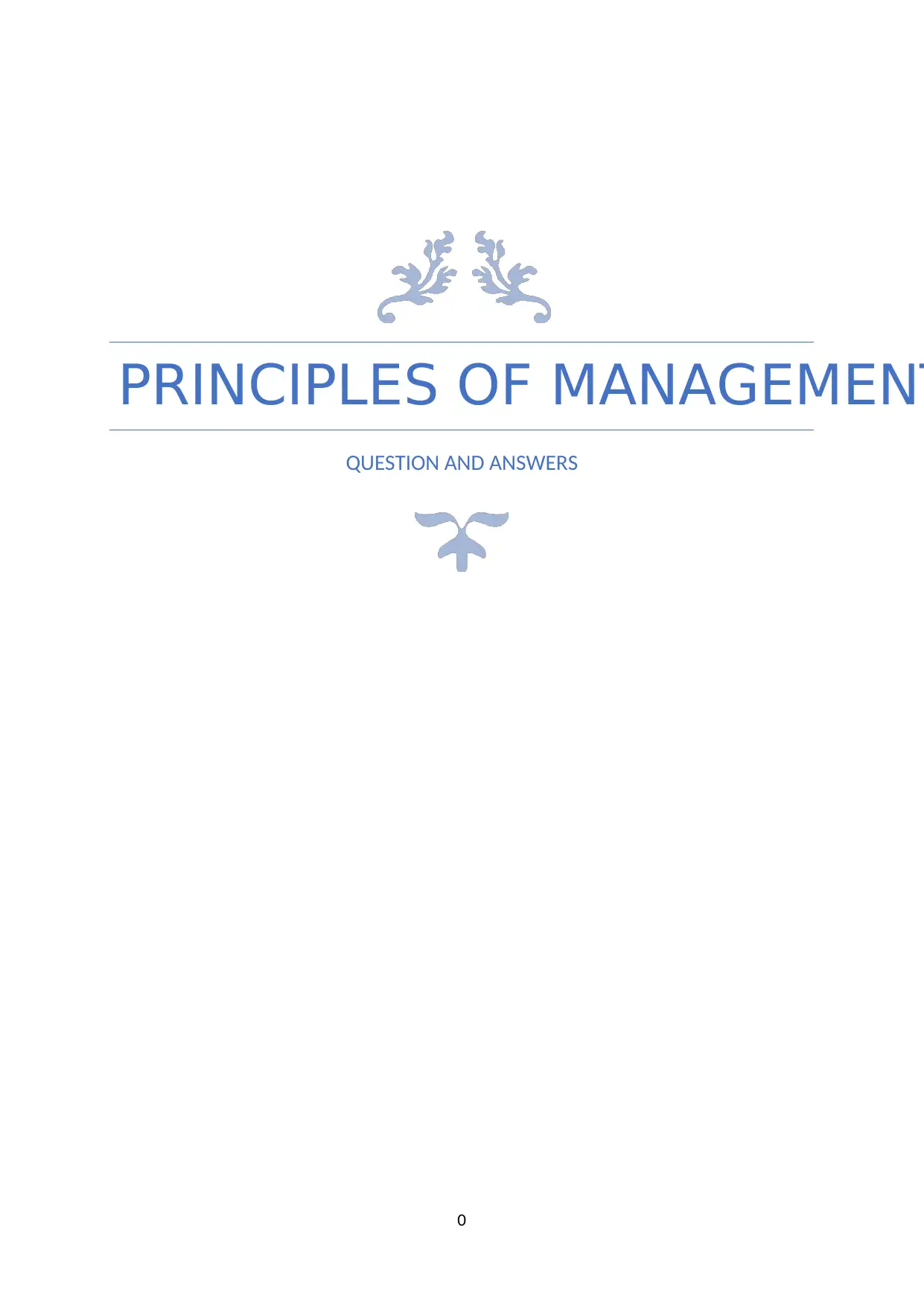
0
PRINCIPLES OF MANAGEMENT
QUESTION AND ANSWERS
PRINCIPLES OF MANAGEMENT
QUESTION AND ANSWERS
Paraphrase This Document
Need a fresh take? Get an instant paraphrase of this document with our AI Paraphraser
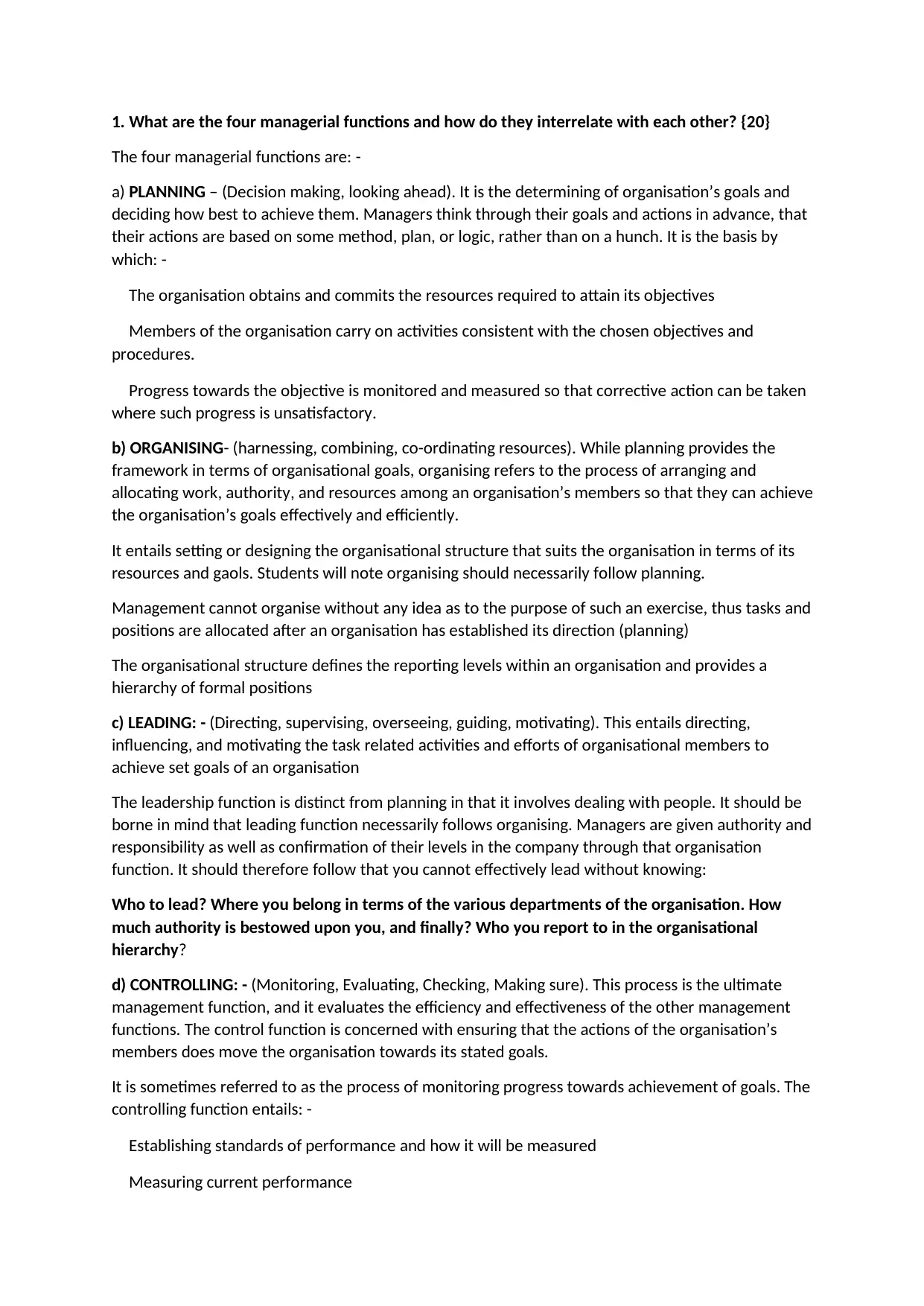
1. What are the four managerial functions and how do they interrelate with each other? {20}
The four managerial functions are: -
a) PLANNING – (Decision making, looking ahead). It is the determining of organisation’s goals and
deciding how best to achieve them. Managers think through their goals and actions in advance, that
their actions are based on some method, plan, or logic, rather than on a hunch. It is the basis by
which: -
The organisation obtains and commits the resources required to attain its objectives
Members of the organisation carry on activities consistent with the chosen objectives and
procedures.
Progress towards the objective is monitored and measured so that corrective action can be taken
where such progress is unsatisfactory.
b) ORGANISING- (harnessing, combining, co-ordinating resources). While planning provides the
framework in terms of organisational goals, organising refers to the process of arranging and
allocating work, authority, and resources among an organisation’s members so that they can achieve
the organisation’s goals effectively and efficiently.
It entails setting or designing the organisational structure that suits the organisation in terms of its
resources and gaols. Students will note organising should necessarily follow planning.
Management cannot organise without any idea as to the purpose of such an exercise, thus tasks and
positions are allocated after an organisation has established its direction (planning)
The organisational structure defines the reporting levels within an organisation and provides a
hierarchy of formal positions
c) LEADING: - (Directing, supervising, overseeing, guiding, motivating). This entails directing,
influencing, and motivating the task related activities and efforts of organisational members to
achieve set goals of an organisation
The leadership function is distinct from planning in that it involves dealing with people. It should be
borne in mind that leading function necessarily follows organising. Managers are given authority and
responsibility as well as confirmation of their levels in the company through that organisation
function. It should therefore follow that you cannot effectively lead without knowing:
Who to lead? Where you belong in terms of the various departments of the organisation. How
much authority is bestowed upon you, and finally? Who you report to in the organisational
hierarchy?
d) CONTROLLING: - (Monitoring, Evaluating, Checking, Making sure). This process is the ultimate
management function, and it evaluates the efficiency and effectiveness of the other management
functions. The control function is concerned with ensuring that the actions of the organisation’s
members does move the organisation towards its stated goals.
It is sometimes referred to as the process of monitoring progress towards achievement of goals. The
controlling function entails: -
Establishing standards of performance and how it will be measured
Measuring current performance
The four managerial functions are: -
a) PLANNING – (Decision making, looking ahead). It is the determining of organisation’s goals and
deciding how best to achieve them. Managers think through their goals and actions in advance, that
their actions are based on some method, plan, or logic, rather than on a hunch. It is the basis by
which: -
The organisation obtains and commits the resources required to attain its objectives
Members of the organisation carry on activities consistent with the chosen objectives and
procedures.
Progress towards the objective is monitored and measured so that corrective action can be taken
where such progress is unsatisfactory.
b) ORGANISING- (harnessing, combining, co-ordinating resources). While planning provides the
framework in terms of organisational goals, organising refers to the process of arranging and
allocating work, authority, and resources among an organisation’s members so that they can achieve
the organisation’s goals effectively and efficiently.
It entails setting or designing the organisational structure that suits the organisation in terms of its
resources and gaols. Students will note organising should necessarily follow planning.
Management cannot organise without any idea as to the purpose of such an exercise, thus tasks and
positions are allocated after an organisation has established its direction (planning)
The organisational structure defines the reporting levels within an organisation and provides a
hierarchy of formal positions
c) LEADING: - (Directing, supervising, overseeing, guiding, motivating). This entails directing,
influencing, and motivating the task related activities and efforts of organisational members to
achieve set goals of an organisation
The leadership function is distinct from planning in that it involves dealing with people. It should be
borne in mind that leading function necessarily follows organising. Managers are given authority and
responsibility as well as confirmation of their levels in the company through that organisation
function. It should therefore follow that you cannot effectively lead without knowing:
Who to lead? Where you belong in terms of the various departments of the organisation. How
much authority is bestowed upon you, and finally? Who you report to in the organisational
hierarchy?
d) CONTROLLING: - (Monitoring, Evaluating, Checking, Making sure). This process is the ultimate
management function, and it evaluates the efficiency and effectiveness of the other management
functions. The control function is concerned with ensuring that the actions of the organisation’s
members does move the organisation towards its stated goals.
It is sometimes referred to as the process of monitoring progress towards achievement of goals. The
controlling function entails: -
Establishing standards of performance and how it will be measured
Measuring current performance
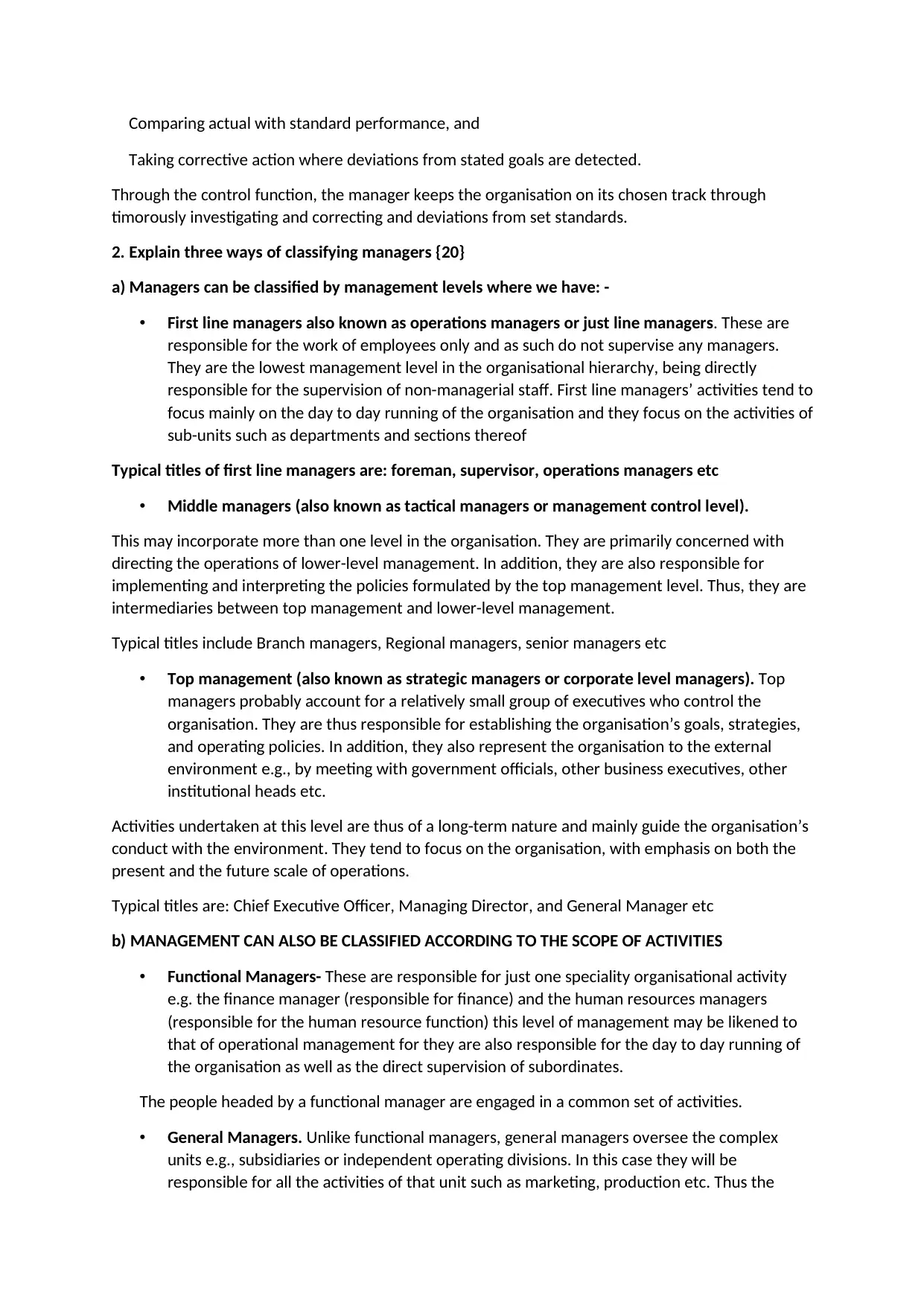
Comparing actual with standard performance, and
Taking corrective action where deviations from stated goals are detected.
Through the control function, the manager keeps the organisation on its chosen track through
timorously investigating and correcting and deviations from set standards.
2. Explain three ways of classifying managers {20}
a) Managers can be classified by management levels where we have: -
• First line managers also known as operations managers or just line managers. These are
responsible for the work of employees only and as such do not supervise any managers.
They are the lowest management level in the organisational hierarchy, being directly
responsible for the supervision of non-managerial staff. First line managers’ activities tend to
focus mainly on the day to day running of the organisation and they focus on the activities of
sub-units such as departments and sections thereof
Typical titles of first line managers are: foreman, supervisor, operations managers etc
• Middle managers (also known as tactical managers or management control level).
This may incorporate more than one level in the organisation. They are primarily concerned with
directing the operations of lower-level management. In addition, they are also responsible for
implementing and interpreting the policies formulated by the top management level. Thus, they are
intermediaries between top management and lower-level management.
Typical titles include Branch managers, Regional managers, senior managers etc
• Top management (also known as strategic managers or corporate level managers). Top
managers probably account for a relatively small group of executives who control the
organisation. They are thus responsible for establishing the organisation’s goals, strategies,
and operating policies. In addition, they also represent the organisation to the external
environment e.g., by meeting with government officials, other business executives, other
institutional heads etc.
Activities undertaken at this level are thus of a long-term nature and mainly guide the organisation’s
conduct with the environment. They tend to focus on the organisation, with emphasis on both the
present and the future scale of operations.
Typical titles are: Chief Executive Officer, Managing Director, and General Manager etc
b) MANAGEMENT CAN ALSO BE CLASSIFIED ACCORDING TO THE SCOPE OF ACTIVITIES
• Functional Managers- These are responsible for just one speciality organisational activity
e.g. the finance manager (responsible for finance) and the human resources managers
(responsible for the human resource function) this level of management may be likened to
that of operational management for they are also responsible for the day to day running of
the organisation as well as the direct supervision of subordinates.
The people headed by a functional manager are engaged in a common set of activities.
• General Managers. Unlike functional managers, general managers oversee the complex
units e.g., subsidiaries or independent operating divisions. In this case they will be
responsible for all the activities of that unit such as marketing, production etc. Thus the
Taking corrective action where deviations from stated goals are detected.
Through the control function, the manager keeps the organisation on its chosen track through
timorously investigating and correcting and deviations from set standards.
2. Explain three ways of classifying managers {20}
a) Managers can be classified by management levels where we have: -
• First line managers also known as operations managers or just line managers. These are
responsible for the work of employees only and as such do not supervise any managers.
They are the lowest management level in the organisational hierarchy, being directly
responsible for the supervision of non-managerial staff. First line managers’ activities tend to
focus mainly on the day to day running of the organisation and they focus on the activities of
sub-units such as departments and sections thereof
Typical titles of first line managers are: foreman, supervisor, operations managers etc
• Middle managers (also known as tactical managers or management control level).
This may incorporate more than one level in the organisation. They are primarily concerned with
directing the operations of lower-level management. In addition, they are also responsible for
implementing and interpreting the policies formulated by the top management level. Thus, they are
intermediaries between top management and lower-level management.
Typical titles include Branch managers, Regional managers, senior managers etc
• Top management (also known as strategic managers or corporate level managers). Top
managers probably account for a relatively small group of executives who control the
organisation. They are thus responsible for establishing the organisation’s goals, strategies,
and operating policies. In addition, they also represent the organisation to the external
environment e.g., by meeting with government officials, other business executives, other
institutional heads etc.
Activities undertaken at this level are thus of a long-term nature and mainly guide the organisation’s
conduct with the environment. They tend to focus on the organisation, with emphasis on both the
present and the future scale of operations.
Typical titles are: Chief Executive Officer, Managing Director, and General Manager etc
b) MANAGEMENT CAN ALSO BE CLASSIFIED ACCORDING TO THE SCOPE OF ACTIVITIES
• Functional Managers- These are responsible for just one speciality organisational activity
e.g. the finance manager (responsible for finance) and the human resources managers
(responsible for the human resource function) this level of management may be likened to
that of operational management for they are also responsible for the day to day running of
the organisation as well as the direct supervision of subordinates.
The people headed by a functional manager are engaged in a common set of activities.
• General Managers. Unlike functional managers, general managers oversee the complex
units e.g., subsidiaries or independent operating divisions. In this case they will be
responsible for all the activities of that unit such as marketing, production etc. Thus the
⊘ This is a preview!⊘
Do you want full access?
Subscribe today to unlock all pages.

Trusted by 1+ million students worldwide
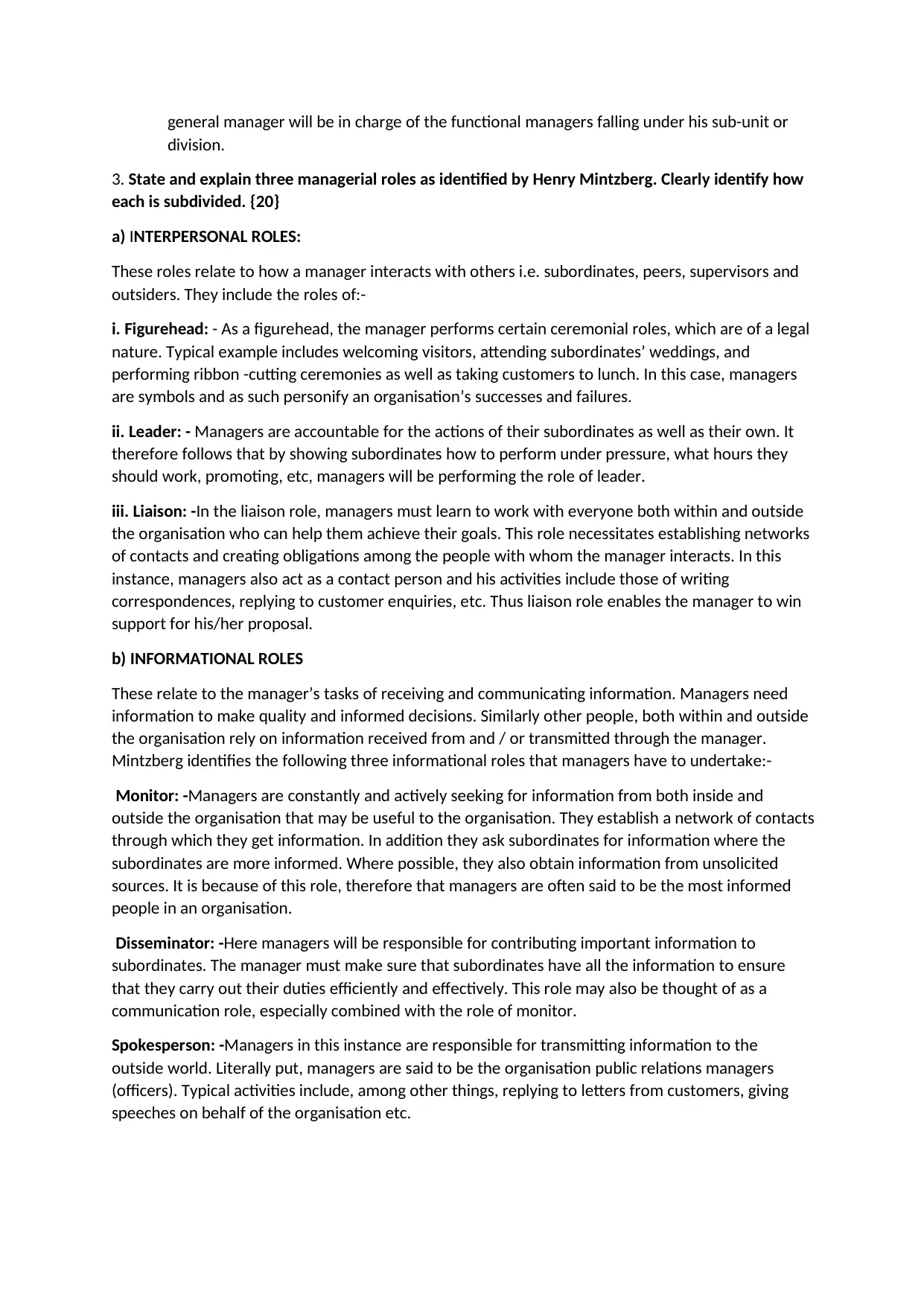
general manager will be in charge of the functional managers falling under his sub-unit or
division.
3. State and explain three managerial roles as identified by Henry Mintzberg. Clearly identify how
each is subdivided. {20}
a) INTERPERSONAL ROLES:
These roles relate to how a manager interacts with others i.e. subordinates, peers, supervisors and
outsiders. They include the roles of:-
i. Figurehead: - As a figurehead, the manager performs certain ceremonial roles, which are of a legal
nature. Typical example includes welcoming visitors, attending subordinates’ weddings, and
performing ribbon -cutting ceremonies as well as taking customers to lunch. In this case, managers
are symbols and as such personify an organisation’s successes and failures.
ii. Leader: - Managers are accountable for the actions of their subordinates as well as their own. It
therefore follows that by showing subordinates how to perform under pressure, what hours they
should work, promoting, etc, managers will be performing the role of leader.
iii. Liaison: -In the liaison role, managers must learn to work with everyone both within and outside
the organisation who can help them achieve their goals. This role necessitates establishing networks
of contacts and creating obligations among the people with whom the manager interacts. In this
instance, managers also act as a contact person and his activities include those of writing
correspondences, replying to customer enquiries, etc. Thus liaison role enables the manager to win
support for his/her proposal.
b) INFORMATIONAL ROLES
These relate to the manager’s tasks of receiving and communicating information. Managers need
information to make quality and informed decisions. Similarly other people, both within and outside
the organisation rely on information received from and / or transmitted through the manager.
Mintzberg identifies the following three informational roles that managers have to undertake:-
Monitor: -Managers are constantly and actively seeking for information from both inside and
outside the organisation that may be useful to the organisation. They establish a network of contacts
through which they get information. In addition they ask subordinates for information where the
subordinates are more informed. Where possible, they also obtain information from unsolicited
sources. It is because of this role, therefore that managers are often said to be the most informed
people in an organisation.
Disseminator: -Here managers will be responsible for contributing important information to
subordinates. The manager must make sure that subordinates have all the information to ensure
that they carry out their duties efficiently and effectively. This role may also be thought of as a
communication role, especially combined with the role of monitor.
Spokesperson: -Managers in this instance are responsible for transmitting information to the
outside world. Literally put, managers are said to be the organisation public relations managers
(officers). Typical activities include, among other things, replying to letters from customers, giving
speeches on behalf of the organisation etc.
division.
3. State and explain three managerial roles as identified by Henry Mintzberg. Clearly identify how
each is subdivided. {20}
a) INTERPERSONAL ROLES:
These roles relate to how a manager interacts with others i.e. subordinates, peers, supervisors and
outsiders. They include the roles of:-
i. Figurehead: - As a figurehead, the manager performs certain ceremonial roles, which are of a legal
nature. Typical example includes welcoming visitors, attending subordinates’ weddings, and
performing ribbon -cutting ceremonies as well as taking customers to lunch. In this case, managers
are symbols and as such personify an organisation’s successes and failures.
ii. Leader: - Managers are accountable for the actions of their subordinates as well as their own. It
therefore follows that by showing subordinates how to perform under pressure, what hours they
should work, promoting, etc, managers will be performing the role of leader.
iii. Liaison: -In the liaison role, managers must learn to work with everyone both within and outside
the organisation who can help them achieve their goals. This role necessitates establishing networks
of contacts and creating obligations among the people with whom the manager interacts. In this
instance, managers also act as a contact person and his activities include those of writing
correspondences, replying to customer enquiries, etc. Thus liaison role enables the manager to win
support for his/her proposal.
b) INFORMATIONAL ROLES
These relate to the manager’s tasks of receiving and communicating information. Managers need
information to make quality and informed decisions. Similarly other people, both within and outside
the organisation rely on information received from and / or transmitted through the manager.
Mintzberg identifies the following three informational roles that managers have to undertake:-
Monitor: -Managers are constantly and actively seeking for information from both inside and
outside the organisation that may be useful to the organisation. They establish a network of contacts
through which they get information. In addition they ask subordinates for information where the
subordinates are more informed. Where possible, they also obtain information from unsolicited
sources. It is because of this role, therefore that managers are often said to be the most informed
people in an organisation.
Disseminator: -Here managers will be responsible for contributing important information to
subordinates. The manager must make sure that subordinates have all the information to ensure
that they carry out their duties efficiently and effectively. This role may also be thought of as a
communication role, especially combined with the role of monitor.
Spokesperson: -Managers in this instance are responsible for transmitting information to the
outside world. Literally put, managers are said to be the organisation public relations managers
(officers). Typical activities include, among other things, replying to letters from customers, giving
speeches on behalf of the organisation etc.
Paraphrase This Document
Need a fresh take? Get an instant paraphrase of this document with our AI Paraphraser
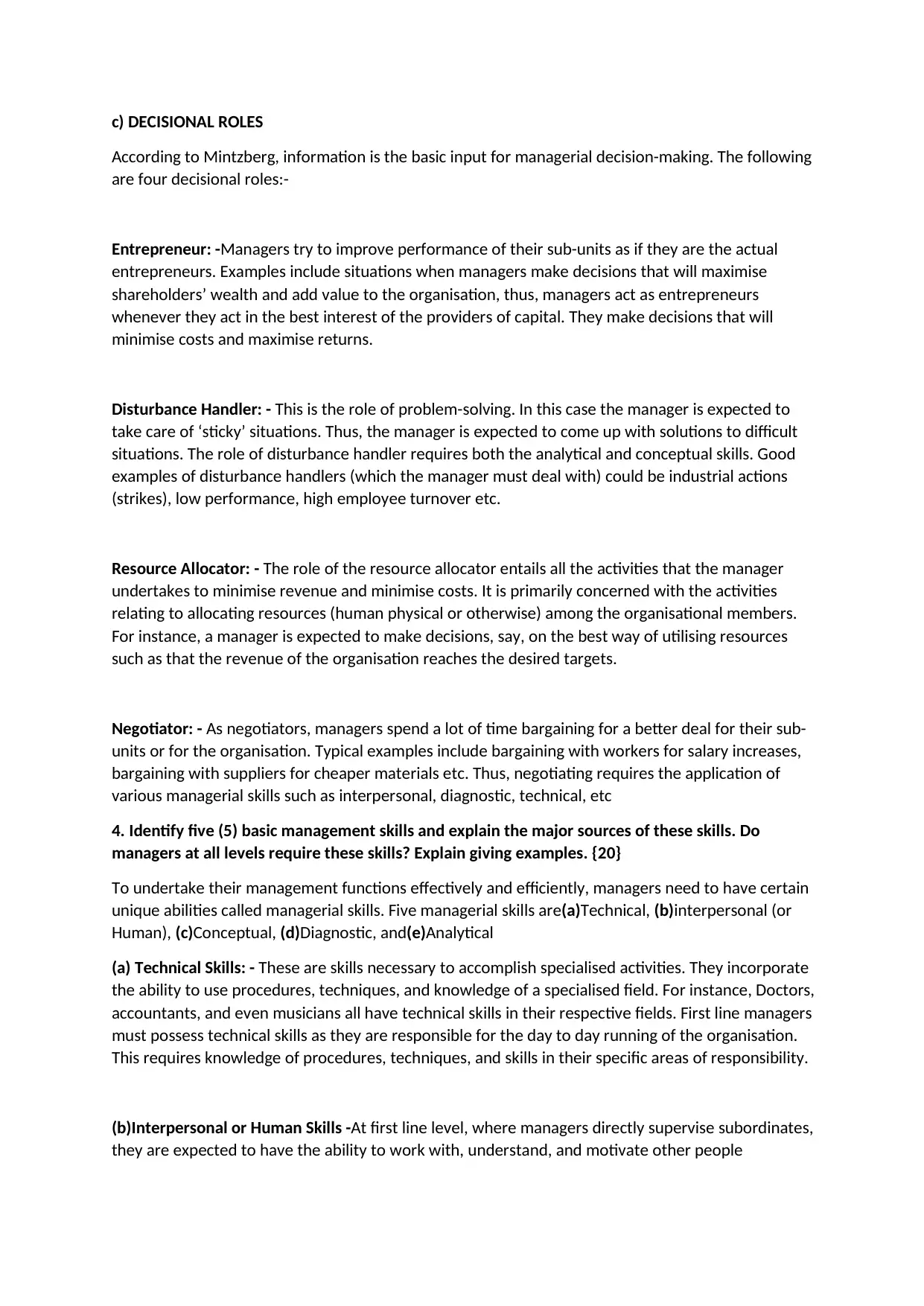
c) DECISIONAL ROLES
According to Mintzberg, information is the basic input for managerial decision-making. The following
are four decisional roles:-
Entrepreneur: -Managers try to improve performance of their sub-units as if they are the actual
entrepreneurs. Examples include situations when managers make decisions that will maximise
shareholders’ wealth and add value to the organisation, thus, managers act as entrepreneurs
whenever they act in the best interest of the providers of capital. They make decisions that will
minimise costs and maximise returns.
Disturbance Handler: - This is the role of problem-solving. In this case the manager is expected to
take care of ‘sticky’ situations. Thus, the manager is expected to come up with solutions to difficult
situations. The role of disturbance handler requires both the analytical and conceptual skills. Good
examples of disturbance handlers (which the manager must deal with) could be industrial actions
(strikes), low performance, high employee turnover etc.
Resource Allocator: - The role of the resource allocator entails all the activities that the manager
undertakes to minimise revenue and minimise costs. It is primarily concerned with the activities
relating to allocating resources (human physical or otherwise) among the organisational members.
For instance, a manager is expected to make decisions, say, on the best way of utilising resources
such as that the revenue of the organisation reaches the desired targets.
Negotiator: - As negotiators, managers spend a lot of time bargaining for a better deal for their sub-
units or for the organisation. Typical examples include bargaining with workers for salary increases,
bargaining with suppliers for cheaper materials etc. Thus, negotiating requires the application of
various managerial skills such as interpersonal, diagnostic, technical, etc
4. Identify five (5) basic management skills and explain the major sources of these skills. Do
managers at all levels require these skills? Explain giving examples. {20}
To undertake their management functions effectively and efficiently, managers need to have certain
unique abilities called managerial skills. Five managerial skills are(a)Technical, (b)interpersonal (or
Human), (c)Conceptual, (d)Diagnostic, and(e)Analytical
(a) Technical Skills: - These are skills necessary to accomplish specialised activities. They incorporate
the ability to use procedures, techniques, and knowledge of a specialised field. For instance, Doctors,
accountants, and even musicians all have technical skills in their respective fields. First line managers
must possess technical skills as they are responsible for the day to day running of the organisation.
This requires knowledge of procedures, techniques, and skills in their specific areas of responsibility.
(b)Interpersonal or Human Skills -At first line level, where managers directly supervise subordinates,
they are expected to have the ability to work with, understand, and motivate other people
According to Mintzberg, information is the basic input for managerial decision-making. The following
are four decisional roles:-
Entrepreneur: -Managers try to improve performance of their sub-units as if they are the actual
entrepreneurs. Examples include situations when managers make decisions that will maximise
shareholders’ wealth and add value to the organisation, thus, managers act as entrepreneurs
whenever they act in the best interest of the providers of capital. They make decisions that will
minimise costs and maximise returns.
Disturbance Handler: - This is the role of problem-solving. In this case the manager is expected to
take care of ‘sticky’ situations. Thus, the manager is expected to come up with solutions to difficult
situations. The role of disturbance handler requires both the analytical and conceptual skills. Good
examples of disturbance handlers (which the manager must deal with) could be industrial actions
(strikes), low performance, high employee turnover etc.
Resource Allocator: - The role of the resource allocator entails all the activities that the manager
undertakes to minimise revenue and minimise costs. It is primarily concerned with the activities
relating to allocating resources (human physical or otherwise) among the organisational members.
For instance, a manager is expected to make decisions, say, on the best way of utilising resources
such as that the revenue of the organisation reaches the desired targets.
Negotiator: - As negotiators, managers spend a lot of time bargaining for a better deal for their sub-
units or for the organisation. Typical examples include bargaining with workers for salary increases,
bargaining with suppliers for cheaper materials etc. Thus, negotiating requires the application of
various managerial skills such as interpersonal, diagnostic, technical, etc
4. Identify five (5) basic management skills and explain the major sources of these skills. Do
managers at all levels require these skills? Explain giving examples. {20}
To undertake their management functions effectively and efficiently, managers need to have certain
unique abilities called managerial skills. Five managerial skills are(a)Technical, (b)interpersonal (or
Human), (c)Conceptual, (d)Diagnostic, and(e)Analytical
(a) Technical Skills: - These are skills necessary to accomplish specialised activities. They incorporate
the ability to use procedures, techniques, and knowledge of a specialised field. For instance, Doctors,
accountants, and even musicians all have technical skills in their respective fields. First line managers
must possess technical skills as they are responsible for the day to day running of the organisation.
This requires knowledge of procedures, techniques, and skills in their specific areas of responsibility.
(b)Interpersonal or Human Skills -At first line level, where managers directly supervise subordinates,
they are expected to have the ability to work with, understand, and motivate other people
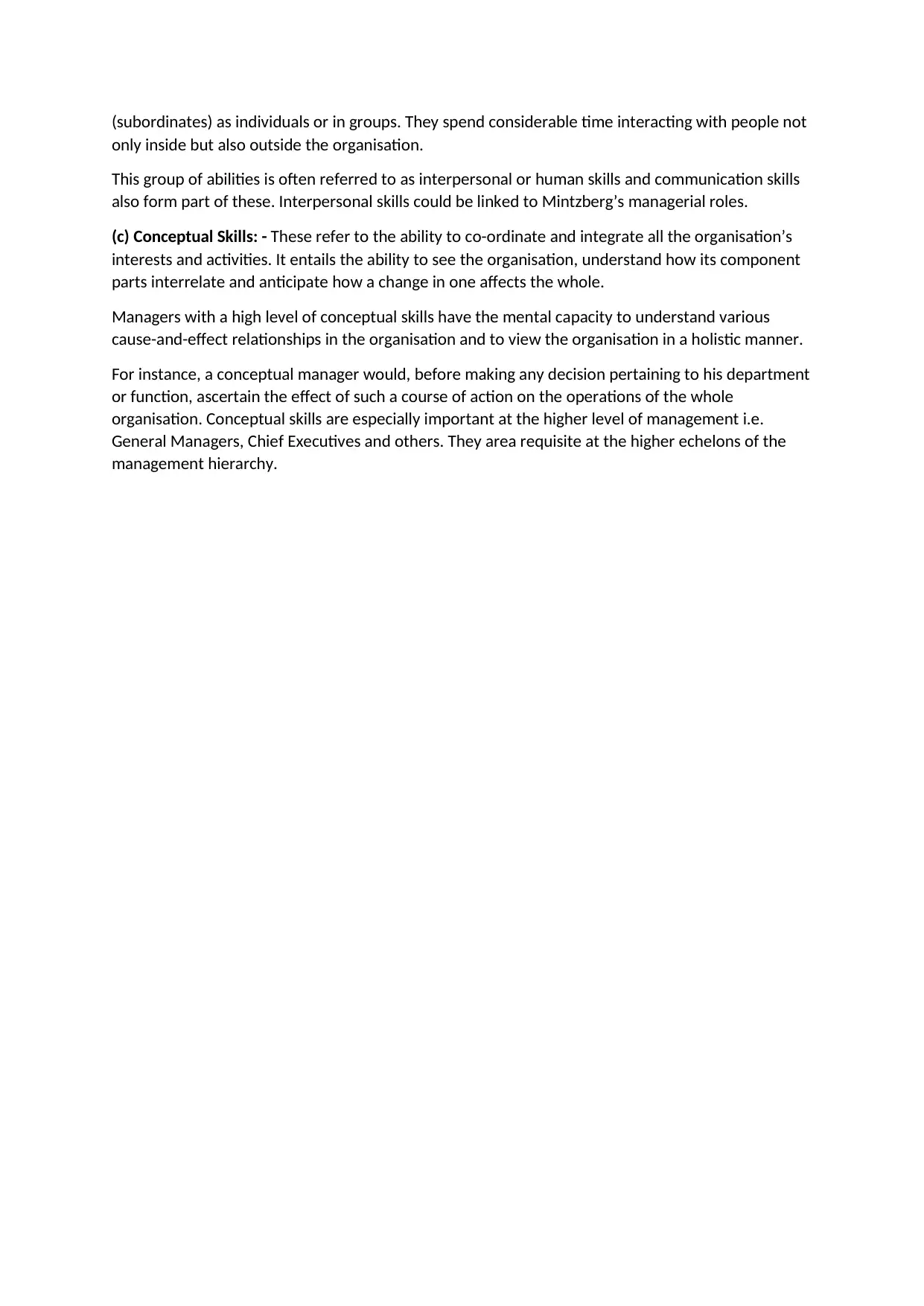
(subordinates) as individuals or in groups. They spend considerable time interacting with people not
only inside but also outside the organisation.
This group of abilities is often referred to as interpersonal or human skills and communication skills
also form part of these. Interpersonal skills could be linked to Mintzberg’s managerial roles.
(c) Conceptual Skills: - These refer to the ability to co-ordinate and integrate all the organisation’s
interests and activities. It entails the ability to see the organisation, understand how its component
parts interrelate and anticipate how a change in one affects the whole.
Managers with a high level of conceptual skills have the mental capacity to understand various
cause-and-effect relationships in the organisation and to view the organisation in a holistic manner.
For instance, a conceptual manager would, before making any decision pertaining to his department
or function, ascertain the effect of such a course of action on the operations of the whole
organisation. Conceptual skills are especially important at the higher level of management i.e.
General Managers, Chief Executives and others. They area requisite at the higher echelons of the
management hierarchy.
only inside but also outside the organisation.
This group of abilities is often referred to as interpersonal or human skills and communication skills
also form part of these. Interpersonal skills could be linked to Mintzberg’s managerial roles.
(c) Conceptual Skills: - These refer to the ability to co-ordinate and integrate all the organisation’s
interests and activities. It entails the ability to see the organisation, understand how its component
parts interrelate and anticipate how a change in one affects the whole.
Managers with a high level of conceptual skills have the mental capacity to understand various
cause-and-effect relationships in the organisation and to view the organisation in a holistic manner.
For instance, a conceptual manager would, before making any decision pertaining to his department
or function, ascertain the effect of such a course of action on the operations of the whole
organisation. Conceptual skills are especially important at the higher level of management i.e.
General Managers, Chief Executives and others. They area requisite at the higher echelons of the
management hierarchy.
⊘ This is a preview!⊘
Do you want full access?
Subscribe today to unlock all pages.

Trusted by 1+ million students worldwide
1 out of 6
Related Documents
Your All-in-One AI-Powered Toolkit for Academic Success.
+13062052269
info@desklib.com
Available 24*7 on WhatsApp / Email
![[object Object]](/_next/static/media/star-bottom.7253800d.svg)
Unlock your academic potential
Copyright © 2020–2025 A2Z Services. All Rights Reserved. Developed and managed by ZUCOL.





